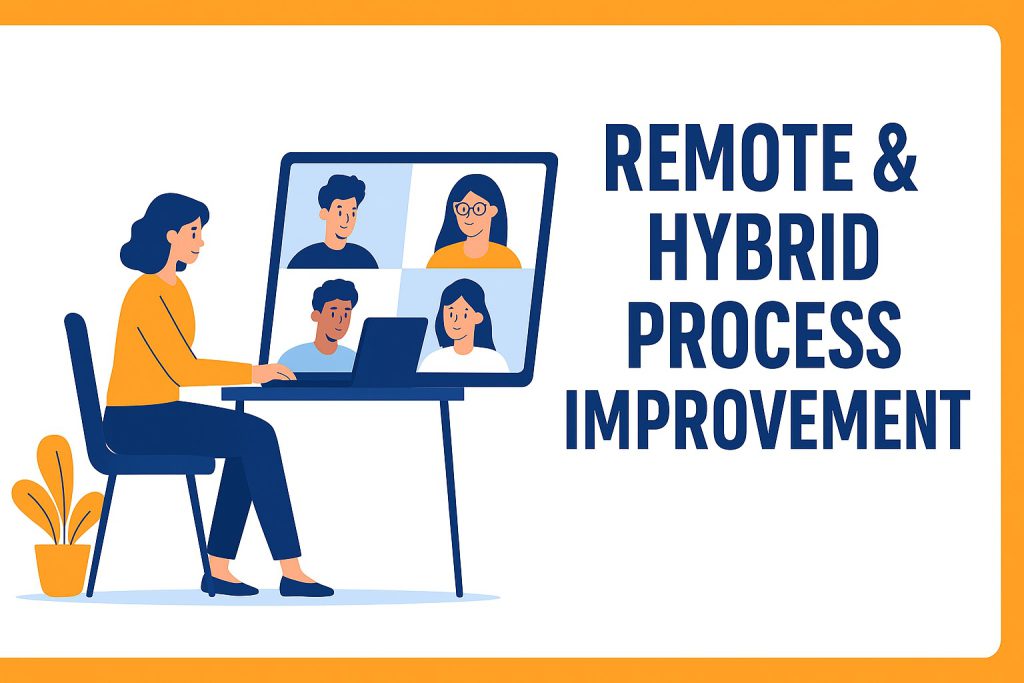The world of work has shifted permanently. Remote and hybrid models are no longer temporary fixes; they are the new reality. For many organizations, this change has created both opportunities and challenges. Teams are now spread across cities, countries, and even continents, yet they are still expected to collaborate seamlessly, deliver results quickly, and continuously improve processes.
This is where process improvement frameworks like Agile and Lean Six Sigma come into play. These methods were originally designed with face-to-face collaboration in mind, but they are highly adaptable to distributed setups when applied thoughtfully. In fact, remote and hybrid process improvement can make teams leaner, smarter, and more resilient: if organizations embrace the right mindset and tools.
The Challenges of Remote Process Improvement
When teams first moved to remote setups, many discovered that what worked in the office didn’t automatically translate online.
Some common challenges include:
Low engagement in virtual meetings. Online fatigue is real. Scrum ceremonies, retrospectives, or Kaizen sessions can feel dull and repetitive without fresh facilitation.
Difficulty spotting bottlenecks. In physical offices, you could walk the floor and see where work piled up. With remote teams, process inefficiencies can remain invisible without digital tracking.
Tool overload. Many teams adopt multiple platforms (Zoom, Slack, Jira, Trello, Miro, Asana, Teams) without integration. Instead of improving processes, tools end up creating confusion.
These hurdles are significant, but they’re not insurmountable. With the right strategies, Agile and Lean Six Sigma can thrive in remote and hybrid environments.
Adapting Agile for Remote & Hybrid Teams
Remote Agile practices require deliberate tweaks to keep collaboration strong:
Virtual Stand-Ups That Add Value. Daily stand-ups should be short, clear, and focused. Remote teams benefit from structured check-ins that include not just task updates but blockers, dependencies, and quick wins.
Digital Kanban Boards. Tools like Jira, Trello, or Miro provide visibility across distributed teams. They allow everyone—from developers to product owners—to see work-in-progress, priorities, and status in real time.
Online Retrospectives With Energy. Retrospectives can lose impact if they feel routine. Using anonymous digital surveys, breakout rooms, and creative icebreakers helps surface honest feedback and keeps the session dynamic.
Asynchronous Collaboration. Remote Agile doesn’t mean everyone must be online at the same time. Teams can record demos, leave structured comments, and provide updates asynchronously, reducing time-zone friction.
Lean Six Sigma in a Remote World
Lean Six Sigma (LSS), traditionally known for in-person workshops and data-heavy projects, also adapts well to distributed models:
Digital Process Mapping. Tools like Lucidchart or MURAL allow remote teams to create and update process maps in real time, mirroring sticky-note sessions in a virtual whiteboard.
Remote DMAIC Projects. Define-Measure-Analyze-Improve-Control cycles can be tracked via cloud dashboards, making project progress transparent to stakeholders.
Data Collection & Analysis. Cloud-based systems now make it easier to track KPIs like cycle times, error rates, or customer satisfaction scores remotely. This keeps the fact-driven core of Lean Six Sigma intact.
Virtual Kaizen Events. Even improvement workshops can be run online using collaborative platforms, breakout groups, and timeboxed sessions.
The result? Teams don’t lose momentum just because they aren’t in the same room.
Best Practices for Remote & Hybrid Process Improvement
Organizations that succeed with remote Agile and Lean Six Sigma follow a few common principles:
Over-communicate visually. Replace walls of text with visual boards, graphs, and dashboards to make progress and issues easy to digest.
Rotate facilitators. Keep energy high in Scrum ceremonies and LSS workshops by letting different team members take the lead.
Invest in digital fluency. Tools are only as effective as the people using them. Teams need training in not just Agile or LSS, but in how to collaborate remotely.
Balance synchronous and asynchronous work. Respect different time zones and avoid burnout by blending live sessions with flexible, asynchronous updates.
Celebrate wins. Remote setups can feel isolating. Recognizing small improvements and milestones keeps teams engaged and motivated.
The Benefits of Getting It Right
Organizations that embrace remote and hybrid process improvement unlock significant advantages:
Access to global talent. Teams can hire the best people, regardless of location.
Lower overheads. Remote-first processes reduce physical office costs.
Faster digital transformation. Distributed setups push organizations to adopt modern tools and mindsets.
Resilience and adaptability. Teams that can collaborate and improve remotely are better prepared for future disruptions.
Far from being a barrier, remote and hybrid models can be catalysts for smarter, leaner, and more sustainable ways of working.
Conclusion
Remote and hybrid work is not a passing trend—it’s the foundation of modern business. Agile and Lean Six Sigma, when adapted for digital collaboration, provide a roadmap for continuous improvement in this new world of work. The key lies in moving beyond old habits, embracing digital tools, and cultivating a culture where improvement is everyone’s responsibility, no matter where they are.
The organizations that will thrive are those that see remote process improvement not as a compromise, but as an opportunity to innovate.
👉 Ready to take your team’s Agile and Lean Six Sigma skills into the future of remote and hybrid work?
Visit scrumconsult.com today to explore training programs in Scrum Master Certification, Agile Expert, Project Management, Product Owner, Lean Six Sigma Green & Black Belts, SMC, PSM, and CSM.
Take the next step, because the future of improvement is remote, and it starts with you.

